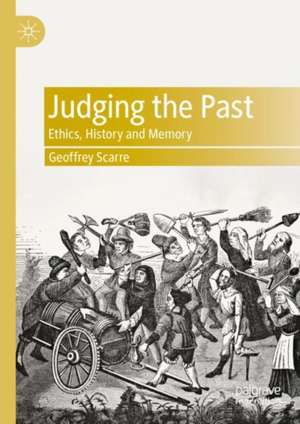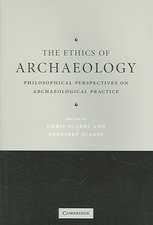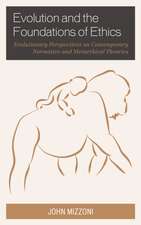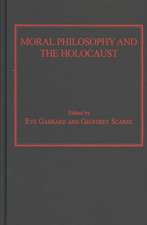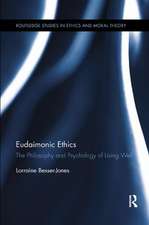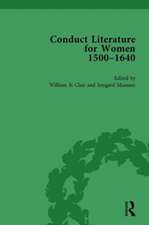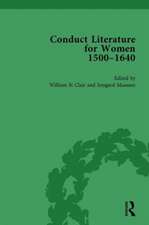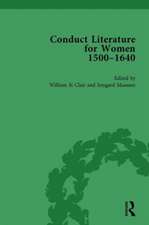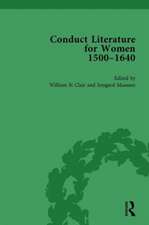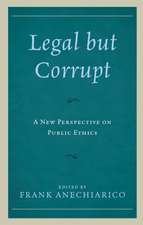Judging the Past: Ethics, History and Memory
Autor Geoffrey Scarreen Limba Engleză Hardback – 13 sep 2023
Some philosophers argue that because we can see things only from our own peculiar historical situation, we lack a sufficiently objective vantage point from which to appraise past people and their acts. If they are correct, then the judgements passed by twenty-first-century people must inevitably be biased and irrelevant, grounded on moral standards that would have seemed alien in that 'foreign country' of the past.
This book challenges this relativistic position, contending that it seriously underestimates our ability to engage imaginatively with people who, however much their lifestyles may have differed from our own, were our fellow human beings, endowed with the samebasic instincts, aversions, desires and aspirations.
Taking a stand on a naturalistic theory of human beings, coupled with a Kantian conception of the equal worth of all human members of the Kingdom of Ends, Scarre argues that historical moral judgements can be sensitive to circumstances, fitting and fair, and untainted by anachronism. The discussion ends by examining the implications of this position for the practice of historians and for the ethics of memory and commemoration.
Preț: 698.15 lei
Preț vechi: 821.35 lei
-15% Nou
Puncte Express: 1047
Preț estimativ în valută:
133.59€ • 139.83$ • 111.19£
133.59€ • 139.83$ • 111.19£
Carte tipărită la comandă
Livrare economică 31 martie-14 aprilie
Preluare comenzi: 021 569.72.76
Specificații
ISBN-13: 9783031345104
ISBN-10: 303134510X
Ilustrații: X, 240 p.
Dimensiuni: 148 x 210 mm
Greutate: 0.45 kg
Ediția:1st ed. 2023
Editura: Springer Nature Switzerland
Colecția Palgrave Macmillan
Locul publicării:Cham, Switzerland
ISBN-10: 303134510X
Ilustrații: X, 240 p.
Dimensiuni: 148 x 210 mm
Greutate: 0.45 kg
Ediția:1st ed. 2023
Editura: Springer Nature Switzerland
Colecția Palgrave Macmillan
Locul publicării:Cham, Switzerland
Cuprins
1 Prelude: The Demo(li)tion of Edward Colston.- 2 Introduction.- 1 The Problems of Access and Relevance.- 2 The Past as both Foreign and Familiar.- 3 When ‘Jagged Worldviews Collide’.- 3 The Relativity of Distance.- 1 Williams on the Relativity of (Temporal) Distance.- 2 Internal and External Reasons.- 3 Justice.- 4 Choosing a Standpoint.- 1 ‘Take Nature’s Path, and Mad Opinions Leave’ (Alexander Pope).- 2 Reason and Sentiment in Sociable Living.- 3 Sociability in the Kingdom of Ends.- 5 Agents, Acts and the Relativity of Blame.- 1 Witches and Slaves: The Bearing of Ideology on Moral Responsibility.- 2 Fricker and the Relativity of Blame.- 3 The Scope and Limits of Conscience.- 4 Siuation-Adjusted Moral Judgements.- 6 Interlude: A Late-Medieval ‘Hand-List’ of Offences against Sociability: Or, Plus ça change, plus c’est la même chose.- 7 History: Morally Heavy or Morally Light?.- 1 To Judge, or Not to Judge?.- 2 Defining the Historian’s Role(s): A Short History of History.- 3 History and Human Self-Knowledge.- 8 The Morality of Memory.- 1 The Need to Remember.- 2 Warts-and-all History (But Not Forgetting the Beauty-Spots) 172 9 Historical Biography: Giving the Dead Their Due.- 1 Who Should Be Remembered?.- 2 Historical Biography and its Pitfalls.- 3 Reputation and the Passage of Time.- 10 Postlude: ‘Consider the Ant’.
Notă biografică
Geoffrey Scarre is Professor Emeritus of Philosophy at Durham University, UK, where he has taught and published extensively in moral philosophy and applied ethics for more than three decades. In recent years he has focused particularly on the topics of death and aging, cultural-heritage ethics, and on the ethics of archaeology. His six monographs include Utilitarianism (1996), Death (2007) and On Courage (2010). He has also co-edited The Ethics of Archaeology (2006) and Appropriating the Past (2013), and edited The Palgrave Handbook of the Philosophy of Aging (2013).
Textul de pe ultima copertă
This book presents an extended argument for the thesis that people of the present day are not debarred in principle from passing moral judgement on people who lived in former days, notwithstanding the inevitable differences in social and cultural circumstances that separate us.
Some philosophers argue that because we can see things only from our own peculiar historical situation, we lack a sufficiently objective vantage point from which to appraise past people and their acts. If they are correct, then the judgements passed by twenty-first-century people must inevitably be biased and irrelevant, grounded on moral standards that would have seemed alien in that 'foreign country' of the past.
This book challenges this relativistic position, contending that it seriously underestimates our ability to engage imaginatively with people who, however much their lifestyles may have differed from our own, were our fellow human beings, endowed with the same basic instincts, aversions, desires and aspirations.
Taking a stand on a naturalistic theory of human beings, coupled with a Kantian conception of the equal worth of all human members of the Kingdom of Ends, Scarre argues that historical moral judgements can be sensitive to circumstances, fitting and fair, and untainted by anachronism. The discussion ends by examining the implications of this position for the practice of historians and for the ethics of memory and commemoration.
Some philosophers argue that because we can see things only from our own peculiar historical situation, we lack a sufficiently objective vantage point from which to appraise past people and their acts. If they are correct, then the judgements passed by twenty-first-century people must inevitably be biased and irrelevant, grounded on moral standards that would have seemed alien in that 'foreign country' of the past.
This book challenges this relativistic position, contending that it seriously underestimates our ability to engage imaginatively with people who, however much their lifestyles may have differed from our own, were our fellow human beings, endowed with the same basic instincts, aversions, desires and aspirations.
Taking a stand on a naturalistic theory of human beings, coupled with a Kantian conception of the equal worth of all human members of the Kingdom of Ends, Scarre argues that historical moral judgements can be sensitive to circumstances, fitting and fair, and untainted by anachronism. The discussion ends by examining the implications of this position for the practice of historians and for the ethics of memory and commemoration.
Geoffrey Scarre is Professor Emeritus of Philosophy at Durham University, UK, where he has taught and published extensively in moral philosophy and applied ethics for more than three decades. In recent years he has focused particularly on the topics of death and aging, cultural-heritage ethics, and on the ethics of archaeology. His six monographs include Utilitarianism (1996), Death (2007) and On Courage (2010). He has also co-edited The Ethics of Archaeology (2006) and Appropriating the Past (2013), and edited The Palgrave Handbook of the Philosophy of Aging (2013).
Caracteristici
Fills a gap in the philosophical literature Provides an interdisciplinary appeal to philosophers and historians Utilizes an accessible style
